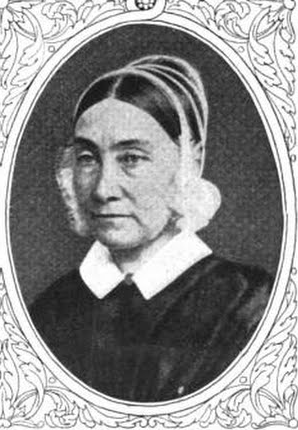Sarah Pugh facts for kids
Sarah Pugh (born October 6, 1800 – died August 1, 1884) was an American activist, teacher, and leader. She worked hard to end slavery and to gain voting rights for women. She also supported the free produce movement, which meant people would not buy products made by enslaved people, like sugar. Sarah Pugh was a key leader of the Philadelphia Female Anti-Slavery Society from 1835 until it closed in 1870. She was also one of the women, along with Lucretia Mott, who were not allowed to be full delegates at the World Anti-Slavery Convention in London because they were women.
Contents
Early Life and Education
Sarah Pugh was born in Alexandria, Virginia, in 1800. Her parents, Jesse and Catherine Pugh, were Quakers. Quakers are a religious group who believe in peace and equality for everyone. Sarah's grandfather was also very active in the movement to end slavery.
When Sarah was only three years old, her father passed away. Her family then moved to Chester County, Pennsylvania, and later to Philadelphia. In Philadelphia, her mother and aunt started a business making clothes.
Sarah went to Westtown Boarding School for two years when she was 12. In 1821, she started teaching at a Friends School. She taught there until 1828. After leaving that school, she started her own school in 1829 with her friend, Rachel Peirce.
Fighting for Change
In 1835, Sarah Pugh became deeply involved in the movement to end slavery. She was inspired after hearing a speech by George Thompson.
The American Anti-Slavery Society was formed in 1833. Even though women were there, they were not allowed to be founders. Because of this, women decided to create their own groups. Just three days later, on December 9, 1833, the Philadelphia Female Anti-Slavery Society was created. This group was special because it included both white and Black women working together. Sarah Pugh joined in 1835 and was a very important part of the group until it stopped in 1870. For 35 years, she gave talks, taught others, asked Congress to make changes, and raised money. She was known for getting things done, especially by leading an annual craft fair that raised a lot of money for the anti-slavery cause in Pennsylvania.
Sarah Pugh was also active in other groups fighting slavery. She was a delegate at the first American Women's Anti-slavery Convention. She also served as the treasurer for the Pennsylvania Anti-Slavery Society from 1843 to 1860. From 1856 to 1864, the leaders of the Pennsylvania Anti-Slavery Society often met at the home Sarah shared with other women.
Pennsylvania Hall Incident
In May 1838, Sarah Pugh attended the second Anti-Slavery Convention of American Women. This meeting was held in Pennsylvania Hall, a new building in Philadelphia built for abolitionists. On May 17, a large group of people who supported slavery became a mob and burned the building down. The women inside, including Sarah Pugh, escaped by walking out in pairs—one Black woman and one white woman, arm-in-arm. This act of unity surprised the mob, giving all the women enough time to escape safely. The next day, the mob returned and finished burning the building. However, the convention did not stop; it continued at Sarah Pugh's school.
Global Efforts and Women's Rights
In June 1840, Sarah Pugh was chosen to go to the World Anti-Slavery Convention in London. Other delegates included Lucretia Mott, Mary Grew, Elizabeth Neall, and Abby Kimber. However, the committee in London decided not to let the American women be full delegates just because they were women. They were only allowed to watch. Sarah Pugh wrote a statement protesting this decision on behalf of the women delegates.
In the 1850s, she traveled with Lucretia Mott to attend meetings about women's rights. In 1851, Sarah Pugh went back to England and spoke about the anti-slavery movement in America.
After the Civil War ended, Sarah Pugh helped support schools for formerly enslaved people and their children. She also became more involved in the women's rights movement, especially the fight for women's right to vote, which grew out of the anti-slavery movement. In 1876, she signed the Declaration of Rights for Women. This was a protest by the National Woman Suffrage Association at the Centennial Exposition, the first World's Fair in the United States. She also joined the Moral Education Society. Sarah Pugh continued her activism until she passed away in 1884.
 | Selma Burke |
 | Pauline Powell Burns |
 | Frederick J. Brown |
 | Robert Blackburn |


